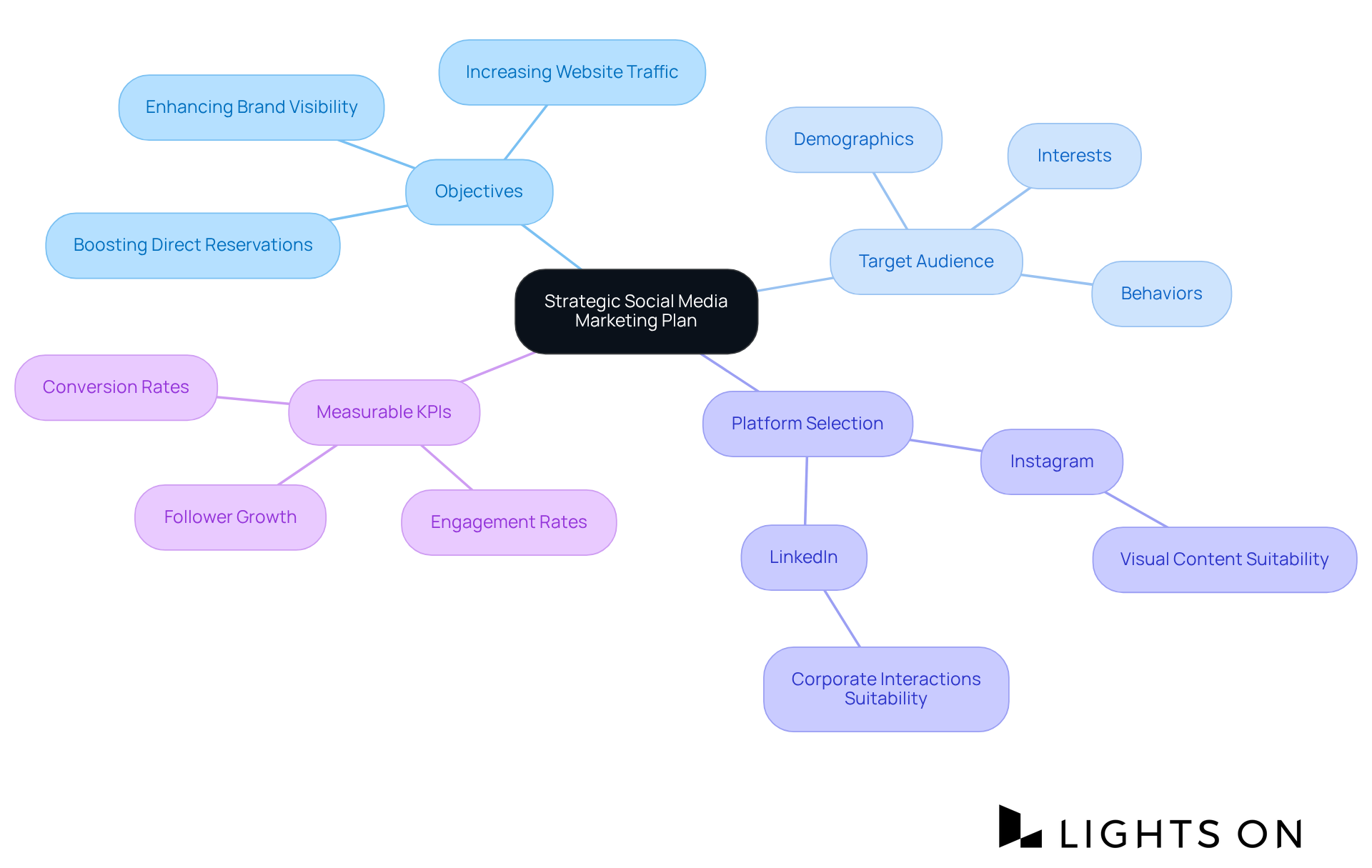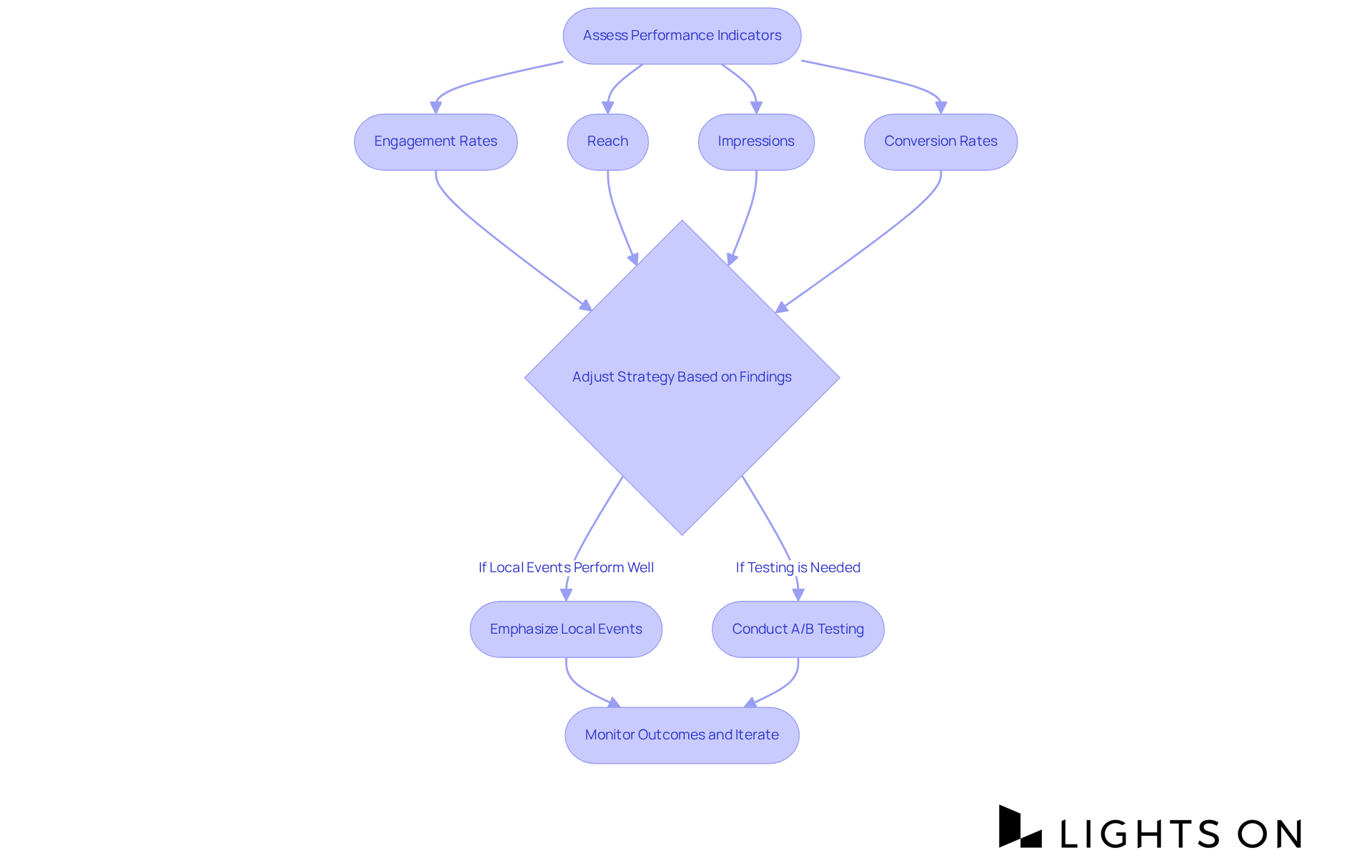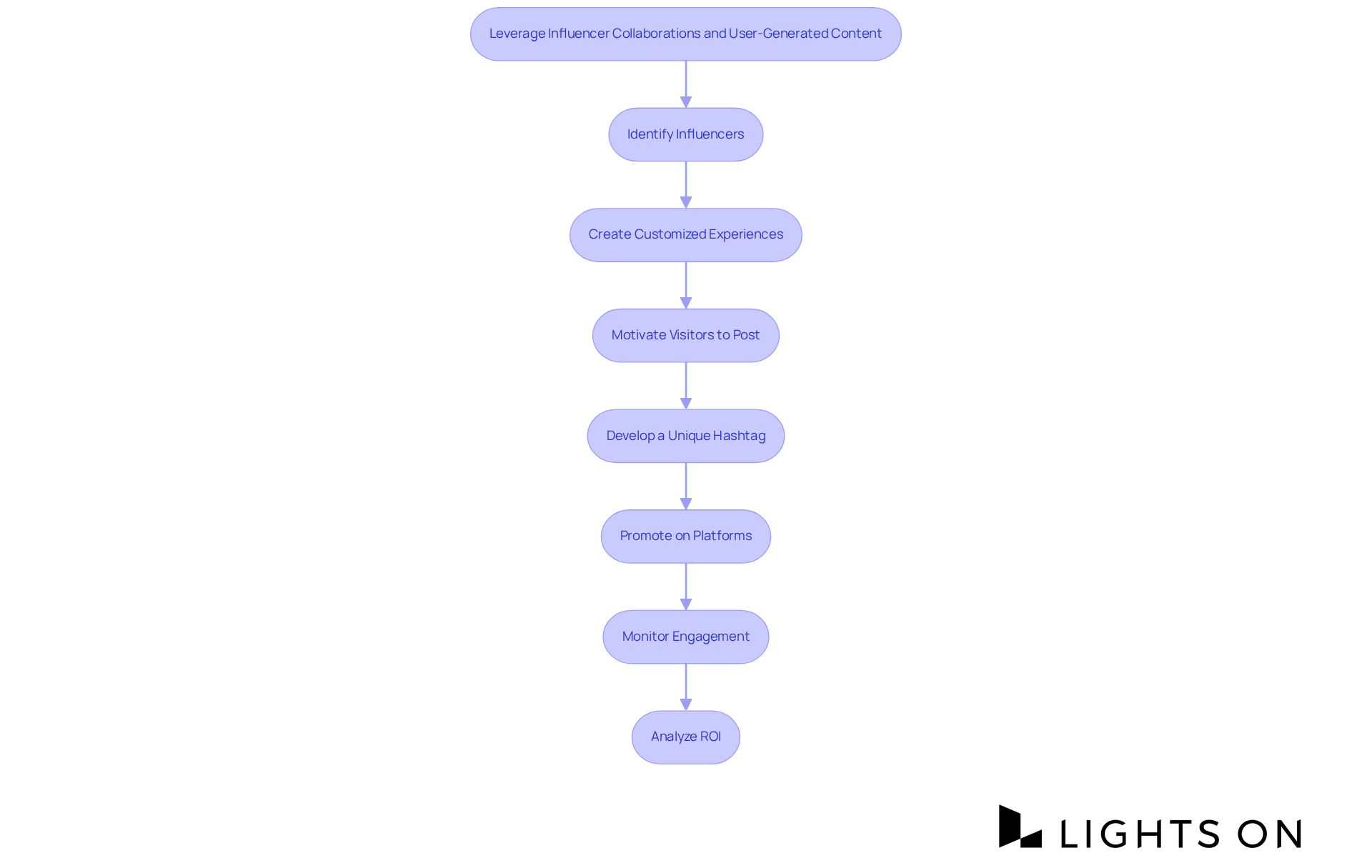The article delves into effective strategies for mastering social media marketing, specifically tailored for hotels. It underscores the necessity of establishing clear objectives in order to enhance marketing efforts. Furthermore, it highlights the creation of engaging content as a vital component in capturing audience attention.
Utilizing analytics for ongoing improvement is also emphasized, as it allows for data-driven insights that can refine marketing strategies. Additionally, leveraging influencer collaborations and user-generated content is presented as a means to enhance brand visibility and drive direct bookings.
This approach is supported by practical examples and measurable outcomes, providing hotel and restaurant owners with actionable insights to overcome their marketing challenges.
Crafting a successful social media marketing strategy is essential for hotels aiming to thrive in an increasingly digital landscape. Engaging content, targeted analytics, and influencer collaborations are powerful tools that can significantly enhance visibility and drive direct bookings. However, the challenge lies in navigating the myriad of platforms and techniques available.
How can accommodations effectively stand out in a crowded marketplace? This article delves into proven strategies that empower hotels to master social media marketing, ensuring they not only capture attention but also foster lasting connections with potential guests.
To create a strategic online marketing plan, accommodations must begin by outlining clear objectives, such as:
This foundational step is crucial for guiding subsequent efforts. Furthermore, identifying the target audience is essential; this can be achieved by analyzing demographics, interests, and behaviors, utilizing tools like Facebook Insights or Google Analytics.
In addition, once the audience is clearly defined, it is imperative to choose the most suitable social media platforms for social media marketing hotel—Instagram serves well for visual content, while LinkedIn is ideal for corporate interactions.
Finally, establishing measurable KPIs, such as:
is vital for tracking progress and adjusting strategies as necessary. For instance, a hotel may aim for a 20% increase in Instagram followers within six months by utilizing social media marketing hotel strategies, leveraging targeted advertisements and captivating content to achieve this goal.

Producing engaging material is essential for hotels seeking to enhance their marketing efforts. This endeavor involves a strategic mix of high-quality visuals, compelling storytelling, and interactive elements. Hotels should effectively showcase their unique offerings through professional photography and videos that highlight not only their amenities but also local attractions and guest experiences. Furthermore, incorporating user-generated content—such as guest photos and testimonials—can significantly enhance authenticity and foster trust among potential visitors.
To encourage interaction, accommodations can organize , polls, or Q&A sessions on popular platforms like Instagram Stories or Facebook Live. For instance, an accommodation could host a photo contest that invites guests to share their best vacation moments, with the winner receiving a complimentary stay. This approach not only enhances engagement but also generates valuable material for the establishment's marketing initiatives. By leveraging these strategies, hotels can create a vibrant community around their brand, ultimately driving interest and bookings.
To leverage the strength of analytics, accommodations must continuously assess performance indicators from their online platforms. Essential metrics to track include engagement rates, reach, impressions, and conversion rates. By employing tools like Google Analytics and integrated network insights, accommodations can gain crucial information about the performance of their materials.
For instance, if an accommodation identifies that posts showcasing local events generate significantly higher engagement, it can adjust its strategy to emphasize more of these posts. Furthermore, conducting A/B testing across different post types can uncover which content connects most efficiently with the audience, encouraging continual improvements in marketing efforts.
Recent benchmarks indicate that for lodging platforms can vary considerably, with effective campaigns achieving rates above 3%, while conversion rates typically remain between 1-2%. By concentrating on these metrics, accommodations can enhance their strategies and achieve improved outcomes.
However, it is crucial to remain vigilant against common pitfalls, such as overemphasizing vanity metrics that do not translate into actual business results. Incorporating real-world examples, like Gervasi Vineyard's successful marketing strategy, illustrates the effectiveness of analytics in driving engagement and revenue. Additionally, citing industry insights, such as Tim Hygh's endorsement of effective marketing strategies, further affirms the significance of analytics in online marketing.

Collaborating with influencers who possess a substantial following in the travel and hospitality industries significantly enhances a lodging establishment's visibility through social media marketing hotel. By inviting influencers for complimentary stays in exchange for online exposure, accommodations can effectively reach a broader audience and attract potential guests.
To optimize this strategy, it is essential for accommodations to:
Furthermore, motivating visitors to post their experiences online with a specific hashtag can generate valuable user-created content that acts as authentic endorsements. For instance, developing a distinctive hashtag for guests to use when sharing their experiences allows the establishment to showcase this content across its online platforms. This strategy not only boosts engagement but also cultivates a sense of community around the brand, encouraging repeat visits.
With 75% of travelers indicating that online platforms , accommodations must focus on social media marketing hotel strategies by leveraging user-generated content and influencer collaborations to enhance their marketing efforts and forge lasting connections with guests. Promoting online platforms and branded hashtags on room keys, signage, and emails can further stimulate guest interaction.
Moreover, influencer marketing has proven to be financially advantageous, yielding $6.50 in revenue for every $1 spent, making it a valuable approach for accommodations. To demonstrate successful implementation, consider a hotel that partnered with a travel influencer who shared a series of posts and stories about their stay, resulting in a notable increase in bookings and social media engagement.

In summary, effective social media marketing for hotels hinges on a well-crafted strategy that encompasses:
By focusing on enhancing brand visibility and driving direct reservations, hotels can create a robust online presence that resonates with potential guests. Establishing measurable KPIs not only aids in tracking progress but also allows for necessary adjustments to ensure marketing efforts yield tangible results.
Furthermore, the article highlights the importance of engaging content and guest interaction as key components of a successful social media strategy. By utilizing high-quality visuals, storytelling, and user-generated content, hotels can foster a vibrant online community that encourages participation and builds trust. In addition, leveraging analytics for continuous improvement and collaborating with influencers can significantly amplify a hotel's reach and effectiveness in attracting guests.
Ultimately, the strategies outlined serve as a roadmap for hotels aiming to master social media marketing. By implementing these best practices, accommodations can not only enhance their visibility but also forge lasting connections with their audience. Embracing these approaches will ensure that hotels remain competitive in the evolving landscape of social media, ultimately leading to increased bookings and guest loyalty.
What are the key objectives for establishing a social media marketing plan for hotels?
The key objectives include enhancing brand visibility, increasing website traffic, and boosting direct reservations.
Why is identifying the target audience important in social media marketing?
Identifying the target audience is essential for tailoring marketing efforts effectively, which can be achieved by analyzing demographics, interests, and behaviors using tools like Facebook Insights or Google Analytics.
How can hotels determine which social media platforms to use?
Hotels can choose the most suitable social media platforms based on the type of content they wish to share; for example, Instagram is effective for visual content, while LinkedIn is better for corporate interactions.
What are some measurable KPIs that hotels should establish for their social media marketing?
Measurable KPIs include engagement rates, follower growth, and conversion rates.
How can hotels track their progress in social media marketing?
Hotels can track progress by monitoring established KPIs, such as aiming for a specific percentage increase in followers or engagement over a set period, and adjusting their strategies accordingly.
Transform your group booking strategies with Lights On and watch your occupancy soar.